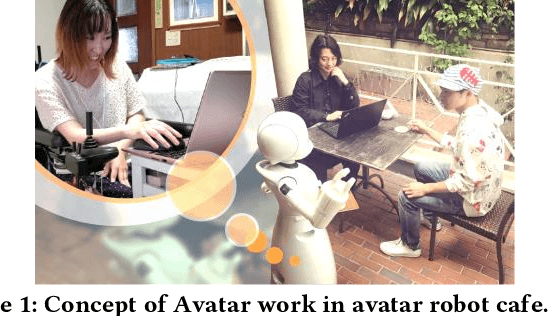Kentaro Yoshifuji
Augmented Body Communicator: Enhancing daily body expression for people with upper limb limitations through LLM and a robotic arm
May 09, 2025Abstract:Individuals with upper limb movement limitations face challenges in interacting with others. Although robotic arms are currently used primarily for functional tasks, there is considerable potential to explore ways to enhance users' body language capabilities during social interactions. This paper introduces an Augmented Body Communicator system that integrates robotic arms and a large language model. Through the incorporation of kinetic memory, disabled users and their supporters can collaboratively design actions for the robot arm. The LLM system then provides suggestions on the most suitable action based on contextual cues during interactions. The system underwent thorough user testing with six participants who have conditions affecting upper limb mobility. Results indicate that the system improves users' ability to express themselves. Based on our findings, we offer recommendations for developing robotic arms that support disabled individuals with body language capabilities and functional tasks.
Interaction in Remote Peddling Using Avatar Robot by People with Disabilities
Dec 02, 2022Abstract:Telework "avatar work," in which people with disabilities can engage in physical work such as customer service, is being implemented in society. In order to enable avatar work in a variety of occupations, we propose a mobile sales system using a mobile frozen drink machine and an avatar robot "OriHime", focusing on mobile customer service like peddling. The effect of the peddling by the system on the customers are examined based on the results of video annotation.
Avatar Work: Telework for Disabled People Unable to Go Outside by Using Avatar Robots "OriHime-D" and Its Verification
Mar 25, 2020



Abstract:In this study, we propose a telework "avatar work" that enables people with disabilities to engage in physical works such as customer service in order to realize an inclusive society, where we can do anything if we have free mind, even though we are bedridden. In avatar work, disabled people can remotely engage in physical work by operating a proposed robot "OriHime-D" with a mouse or gaze input depending on their own disabilities. As a social implementation initiative of avatar work, we have opened a two-week limited avatar robot cafe and have evaluated remote employment by people with disabilities using OriHime-D. As the results by 10 people with disabilities, we have confirmed that the proposed avatar work leads to mental fulfillment for people with disparities, and can be designed with adaptable workload. In addition, we have confirmed that the work content of the experimental cafe is appropriate for people with a variety of disabilities seeking social participation. This study contributes to fulfillment all through life and lifetime working, and at the same time leads to a solution to the employment shortage problem.
* 8 pages, 16 figures, accepted to the 2020 ACM/IEEE International Conference on Human-Robot Interaction (HRI '20 Companion) at alt.HRI session, 2020
 Add to Chrome
Add to Chrome Add to Firefox
Add to Firefox Add to Edge
Add to Edge